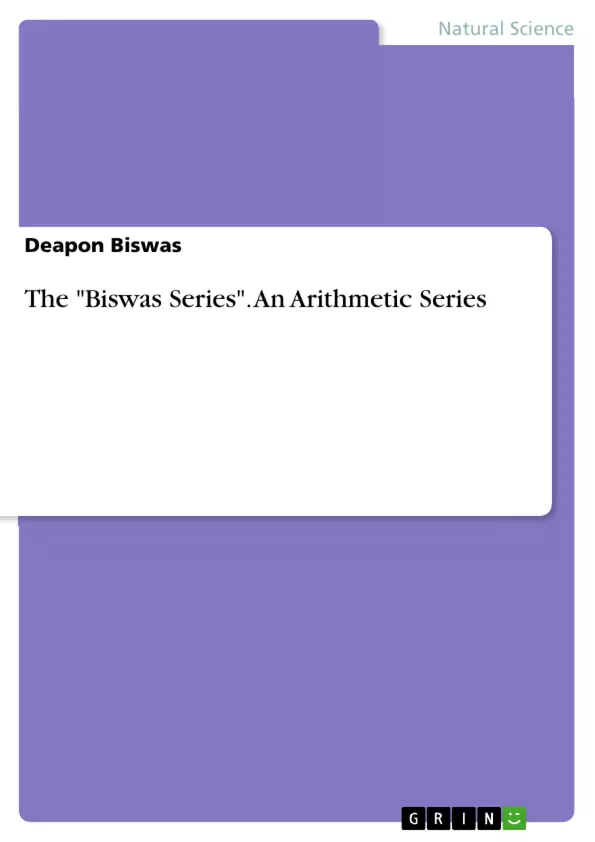We are familiar with series in high school algebra. Here I introduce a more extensive series with manner due to arithmetic series. The series proposed here have two constant parameters, the number of terms N and its step M. It is a finite series of two constant parameters. In this paper I develop 9 theorems to cover this paper and 4 combination rules established as theorems.
Inhaltsverzeichnis (Table of Contents)
- Introduction
- Biswas series
- B first combination rule
- B second combination rule
- B third combination rule
- B fourth combination rule
- Conclusions
Zielsetzung und Themenschwerpunkte (Objectives and Key Themes)
The objective of this paper is to introduce and develop a new mathematical series, named the Biswas series, with two constant parameters: the number of terms N and its step M, where M ≤ N. The paper also aims to establish four combination rules related to the Biswas series, which are presented as theorems.
- Introduction of the Biswas series, a new mathematical series with two constant parameters.
- Development of four combination rules as theorems related to the Biswas series.
- Exploration of the properties and applications of the Biswas series.
- Use of induction and Pascal's rule to derive the Nth term of the M step series.
- Proofs of the theorems related to the combination rules.
Zusammenfassung der Kapitel (Chapter Summaries)
- Introduction: Introduces the Biswas series as a finite series with two constant parameters. It outlines the paper's objective to develop nine theorems, including four combination rules.
- Biswas series: Defines the Biswas series and its properties, highlighting the relationship between the number of terms, step size, and constant parameters.
- B first combination rule: Presents a theorem for expressing the number of combinations of N different things taken j at a time, using a specific combination series.
- B second combination rule: Introduces a theorem that explores the difference between the number of combinations of N different things taken j at a time and M different things taken j at a time, using the results of the previous theorem.
- B third combination rule: Establishes a theorem stating that the number of combinations of zero different things taken zero at a time is one. It utilizes the Biswas series and the concept of the first term to prove this theorem.
Schlüsselwörter (Keywords)
The key focus topics of this paper are the Biswas series, combination rules, and their applications. The primary terms and concepts include: Biswas series, B first combination rule, B second combination rule, B third combination rule, B fourth combination rule, Pascal's rule, induction, and combination series.
Frequently Asked Questions
What is the Biswas Series?
The Biswas Series is a newly introduced finite arithmetic series characterized by two constant parameters: the number of terms (N) and its step (M).
What are the constant parameters of this series?
The parameters are N (number of terms) and M (the step size), where M is less than or equal to N.
How many theorems are developed in this paper?
The author develops 9 theorems in total, which include 4 specific combination rules established as theorems.
What is the B first combination rule?
It is a theorem that expresses the number of combinations of N different things taken j at a time using a specific combination series derived from the Biswas series.
How is the Nth term of the M step series derived?
The paper utilizes mathematical induction and Pascal's rule to derive and prove the Nth term for a given step M.
- Citation du texte
- Deapon Biswas (Auteur), 2018, The "Biswas Series". An Arithmetic Series, Munich, GRIN Verlag, https://www.grin.com/document/453733



